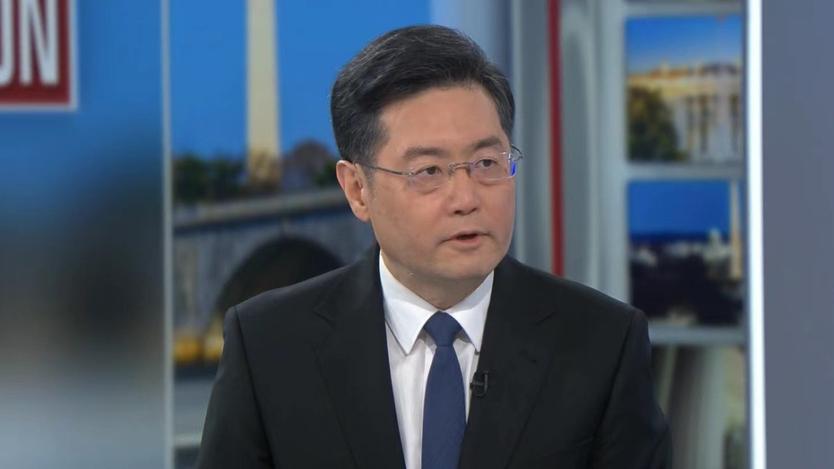Editor's Note: China Daily presents a series of analyses to help readers around the world better understand the how and why behind China's views and decisions on the Ukraine situation. This is the first installment of the series.
 People rest at a temporary settlement site near Mariupol, Ukraine, March 17, 2022. (VICTOR / XINHUA)
People rest at a temporary settlement site near Mariupol, Ukraine, March 17, 2022. (VICTOR / XINHUA)
One month after the Ukraine crisis broke out, China and an increasing number of like-minded nations, particularly developing countries, have voiced objection to unilateral sanctions by United States-led Western countries.
The reasons are clear: Such sanctions will only make the crisis last even longer, break international rules and order, worsen people's livelihoods and aggravate the humanitarian tragedy, officials and analysts said.
One of the clear messages against these sanctions is from President Xi Jinping. He told US President Joe Biden on March 18 that sweeping and indiscriminate sanctions would only make the people suffer.
The recently imposed sanctions are shaking the existing international financial order while dealing heavy blows to the already shaky recovery of the global economy amid the COVID-19 pandemic.
Zhu Jiejin, professor of global governance studies at Fudan University's School of International Relations and Public Affairs
If further escalated, the sanctions could trigger serious crises in global economy and trade, finance, energy, food, and industrial and supply chains, crippling the already languishing world economy and causing irrevocable losses, Xi said.
"China has all along opposed unilateral sanctions that have neither basis in international law nor mandate of the (United Nations) Security Council," and "imposing sanctions is like 'putting out fire with firewood' and will only make things worse", Vice-Foreign Minister Le Yucheng said at a forum on Saturday.
Zhu Jiejin, a professor of global governance studies at Fudan University's School of International Relations and Public Affairs, said, "The recently imposed sanctions are shaking the existing international financial order while dealing heavy blows to the already shaky recovery of the global economy amid the COVID-19 pandemic."
The decision to partly ban Russia from SWIFT, the global messaging system for financial transactions, is "actually turning globalization into a 'weapon' and dampening the world's faith in globalization's future", Zhu said.
"Also, maximizing sanctions to the extreme will only lead to more extreme consequences," he said.
A joint statement issued on Sunday by the foreign ministries of China and Algeria responded to the Ukraine crisis and said both countries oppose indiscriminate application of unilateral sanctions without the support of international law.
Both countries urged avoiding the sabotaging of international rules and harming the livelihoods of people of various countries.
ALSO READ: China firmly opposes unilateral sanctions
None of the other BRICS members-Brazil, India, China and South Africa-has joined in the sanctions against fellow member Russia. G20 members such as Mexico also declined to do so.
Walter Russell Mead, a distinguished fellow at the US Hudson Institute think tank, said China's basic approach-not endorsing Moscow's moves and resisting Western efforts to punish Russia-"has garnered global support".
 Photo taken on March 3, 2022 shows a view of the second round of talks between Russian and Ukrainian delegations at the Belovezhskaya Pushcha on the Belarus-Poland border. (BELTA NEWS AGENCY VIA XINHUA)
Photo taken on March 3, 2022 shows a view of the second round of talks between Russian and Ukrainian delegations at the Belovezhskaya Pushcha on the Belarus-Poland border. (BELTA NEWS AGENCY VIA XINHUA)
The ongoing drive for more sanctions is unlikely to achieve what the Western countries want, but could possibly worsen global inflation, said Ding Yifan, a research fellow at the Development Research Center of the State Council's Institute of World Development
In an article published in The Wall Street Journal on Monday, Mead said, "The West has never been more closely aligned," and "It has also rarely been more alone".
The latest episode in the punitive pushes from the West is that the European Union is mulling its fifth package of sanctions against Russia.
The ongoing drive for more sanctions is unlikely to achieve what the Western countries want, but could possibly worsen global inflation, said Ding Yifan, a research fellow at the Development Research Center of the State Council's Institute of World Development.
The Ukraine crisis is developing in a way that goes beyond itself with spillovers affecting the whole world, and "the momentum of world economic recovery should not be disrupted", said Foreign Ministry spokesman Wang Wenbin on Monday.
Wang spoke of the widely shared view that when addressing regional and international hot-spot issues, war and sanctions are not the only options, and dialogue and negotiation are the fundamental way out. "The people should by no means be made to bear the brunt of geopolitical conflicts and major-country rivalry," he said.
"Unlike the sanctions leveled in recent years, this time more countries, international companies, civic groups and even international organizations joined the ranks of those imposing sanctions. By taking a side, they attempt to avoid also being sanctioned," said Li Wei, a professor at the School of International Studies of Renmin University of China.
While China is also falling prey to the sanctions on Russia in areas such as regular bilateral trade, Washington has threatened potential "consequences" over China's future role in the sanctions, experts noted.
ALSO READ: MOC: No change in China's trade with Russia, Ukraine
When asked on Wednesday about China's role in sanctions against Russia, US National Security Advisor Jake Sullivan warned that the G7 sanctions enforcement initiative "will apply to every significant economy and the decisions that any of those economies take to try in an intentional and active way to undermine or weaken the sanctions".
 Qin Gang, China's ambassador to the United States, is seen on the CBS News show Face the Nation on March 20, 2021. (PHOTO PROVIDED TO CHINA DAILY)
Qin Gang, China's ambassador to the United States, is seen on the CBS News show Face the Nation on March 20, 2021. (PHOTO PROVIDED TO CHINA DAILY)
Neither war nor sanctions can deliver peace. Wielding the baton of sanctions at Chinese companies while seeking China's support and cooperation simply won't work.
Qin Gang, Chinese Ambassador to the US
Chinese Ambassador to the US Qin Gang said earlier this month that "threats against Chinese entities and businesses, as uttered by some US officials, are unacceptable".
"Neither war nor sanctions can deliver peace. Wielding the baton of sanctions at Chinese companies while seeking China's support and cooperation simply won't work," Qin wrote in a signed opinion piece in The Washington Post on March 15.
Wang Peng, a research fellow at Huazhong University of Science and Technology's Institute of State Governance, said, "The US prefers abusing sanctioning when dealing with other countries, but China will not buy it."
Washington has not generally loosened restrictions it has placed on China since 2018, and its policy of containing China has seen no major changes except going deeper into topics such as Asia-Pacific security and the Taiwan question, Wang noted.
"It won't be a problem if Washington would sit at the table with China to discuss a topic based on mutual respect and an equal footing. And China will not be intimidated by any threats or menaces that expose the US' hypocrisy and lack of confidence," Wang said.
Over the past few years, China has also been a major victim of Washington's unilateral sanctions, and Chinese enterprises, particularly in the high-tech industry, have suffered major losses.
READ MORE: Wang: China stands on the right side of history on Ukraine issue
"The facts show that imposing such sanctions will do harm to both sides, and the US has not obtained any major benefit from them," said Tao Wenzhao, a researcher at the Chinese Academy of Social Sciences' Institute of American Studies.


